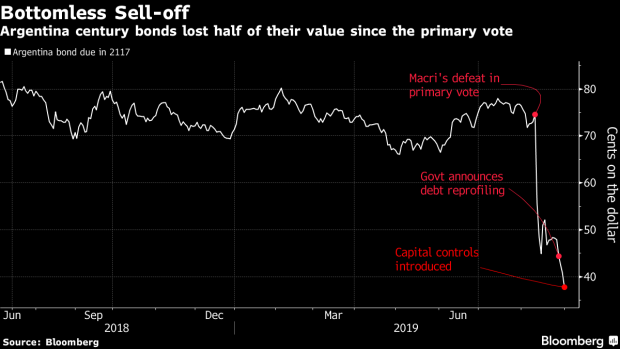Sep 2, 2019
Argentina Bonds Slump as Capital Controls Bring Bad Memories
, Bloomberg News

(Bloomberg) -- Money managers dumped Argentina’s Eurobonds after the government announcement new capital controls, fueling the sense of crisis in the Latin American nation.
The euro-denominated notes due in 2028 fell 4.7% to 35.078 cents, while the ones due in 2033 were traded at 37 cents.
Argentina’s government imposed capital controls to halt a slump in foreign currency reserves and the peso that has pushed the country to the brink of default. Investors and analysts said the measures were not enough to halt the peso slide and that they were likely in place for a long time.
“It’s going to be very hard to rescue the country now,” said Paul McNamara, a money manager at GAM UK. “With capital controls, anyone who is still allowed to take money out is likely to do so. The IMF has already committed a vast rescue package and there’s no one out there with the resources to expand it to the scale needed.”
Argentina’s currency crisis is spiraling out of control. About $3 billion drained out of foreign currency reserves on Thursday and Friday alone as the government struggled to repay short-term debt and slow the drop in the peso. The country risks exhausting its net reserves, which stand at under $15 billion, within weeks if it keeps losing money at this pace.
“It is another worrying sign that history is repeating itself,” Capital Economics economist Edward Glossop wrote in a report on Monday. “A prolonged period of capital controls would be very concerning.”
The century bonds lost half of their value since Mauricio Macri’s shock defeat in the primary election on Aug. 11 triggered a broad sell-off. While initially many analysts said the 40 cents per dollar level could serve as a floor for the bonds, markets are now more pessimistic.
“It can go much lower as the big guys start to sell,” said Alain Nydegger, a money manager at Pala Assets Holdings Ltd. in Zurich. “It is very hard to be optimistic here.”
To contact the reporter on this story: Aline Oyamada in Sao Paulo at aoyamada3@bloomberg.net
To contact the editors responsible for this story: Julia Leite at jleite3@bloomberg.net, Philip Sanders
©2019 Bloomberg L.P.